Charles E W Bean, Diaries, AWM38 3DRL 606/97/1 - January - February 1918 - Part 3
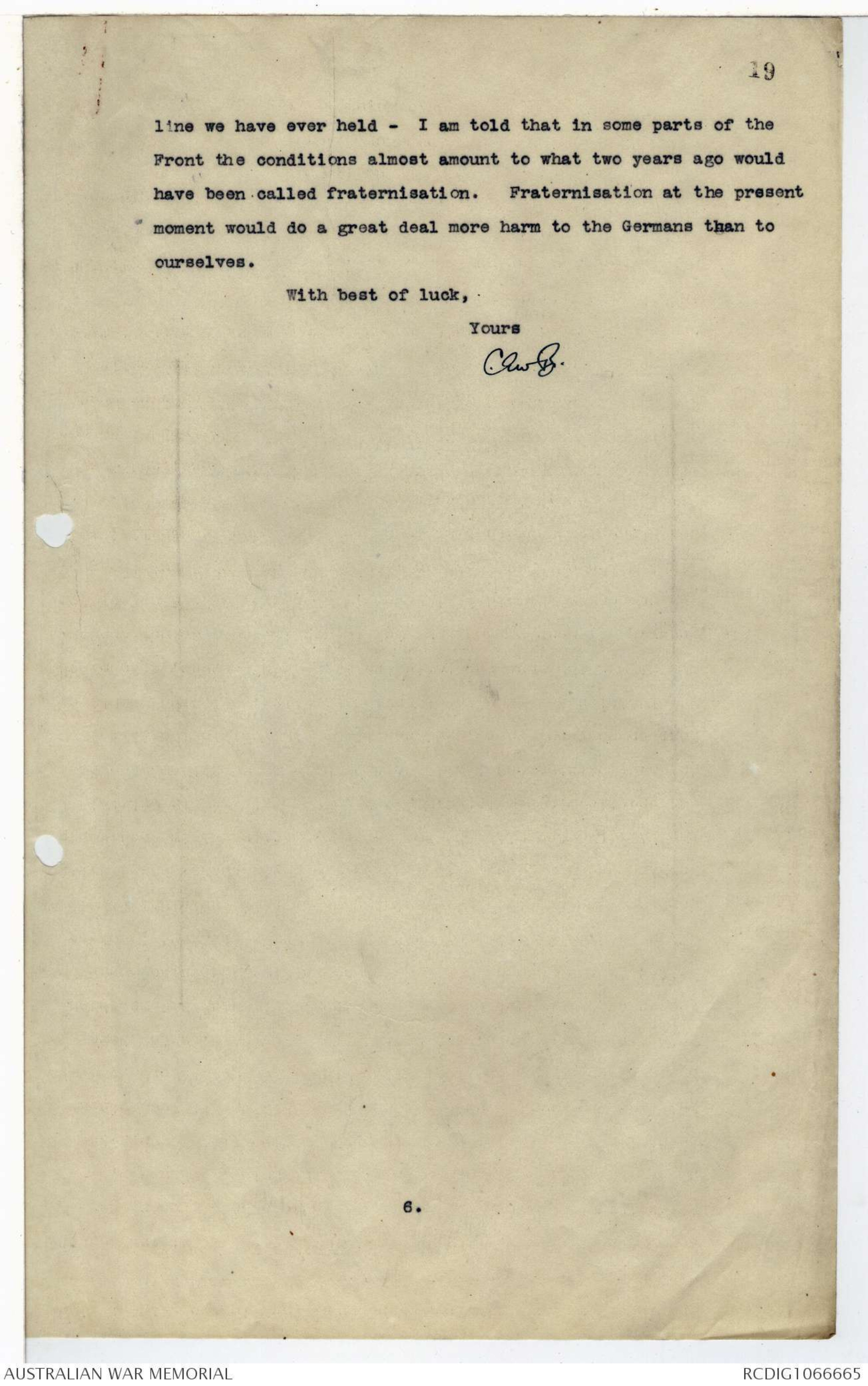
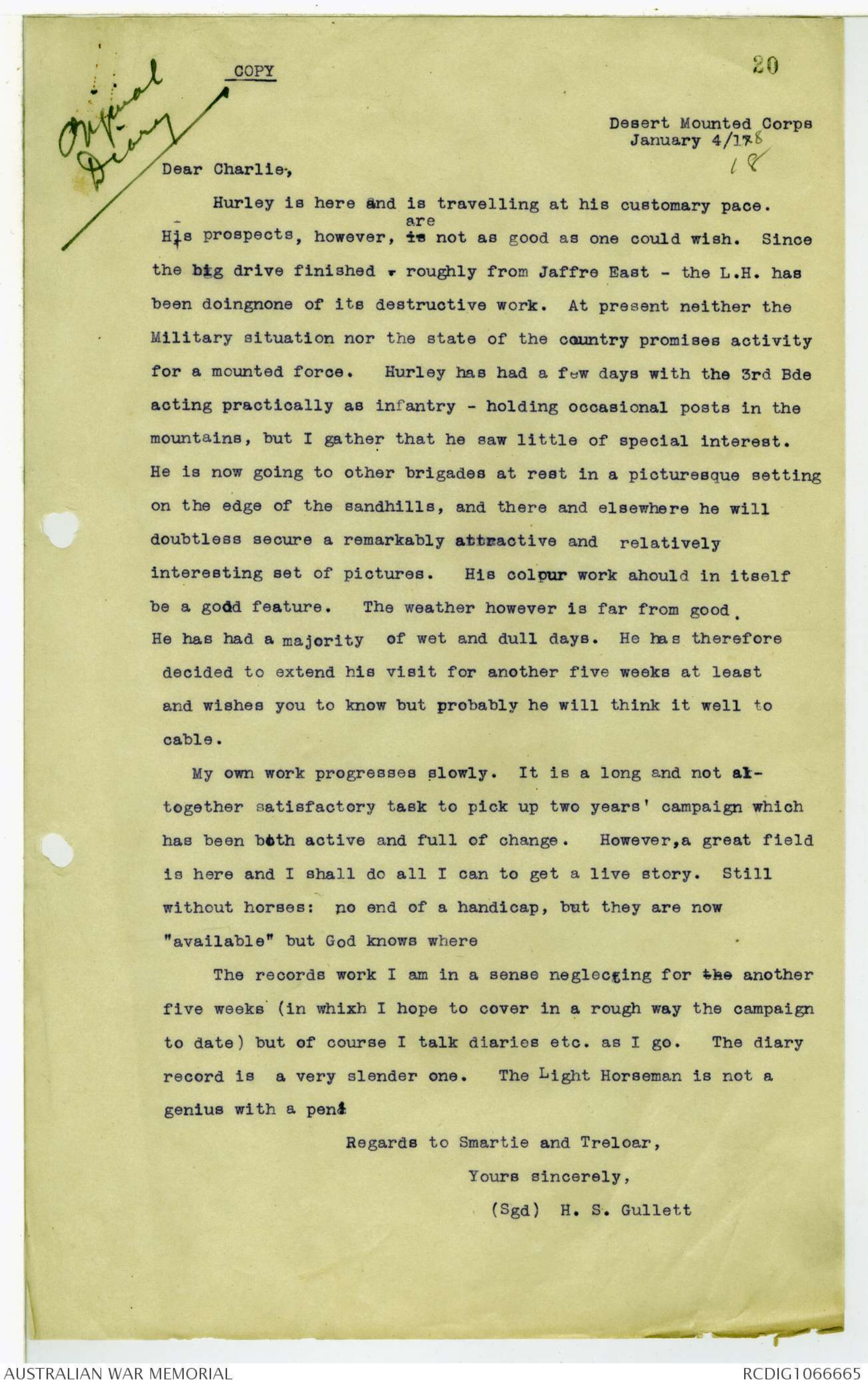
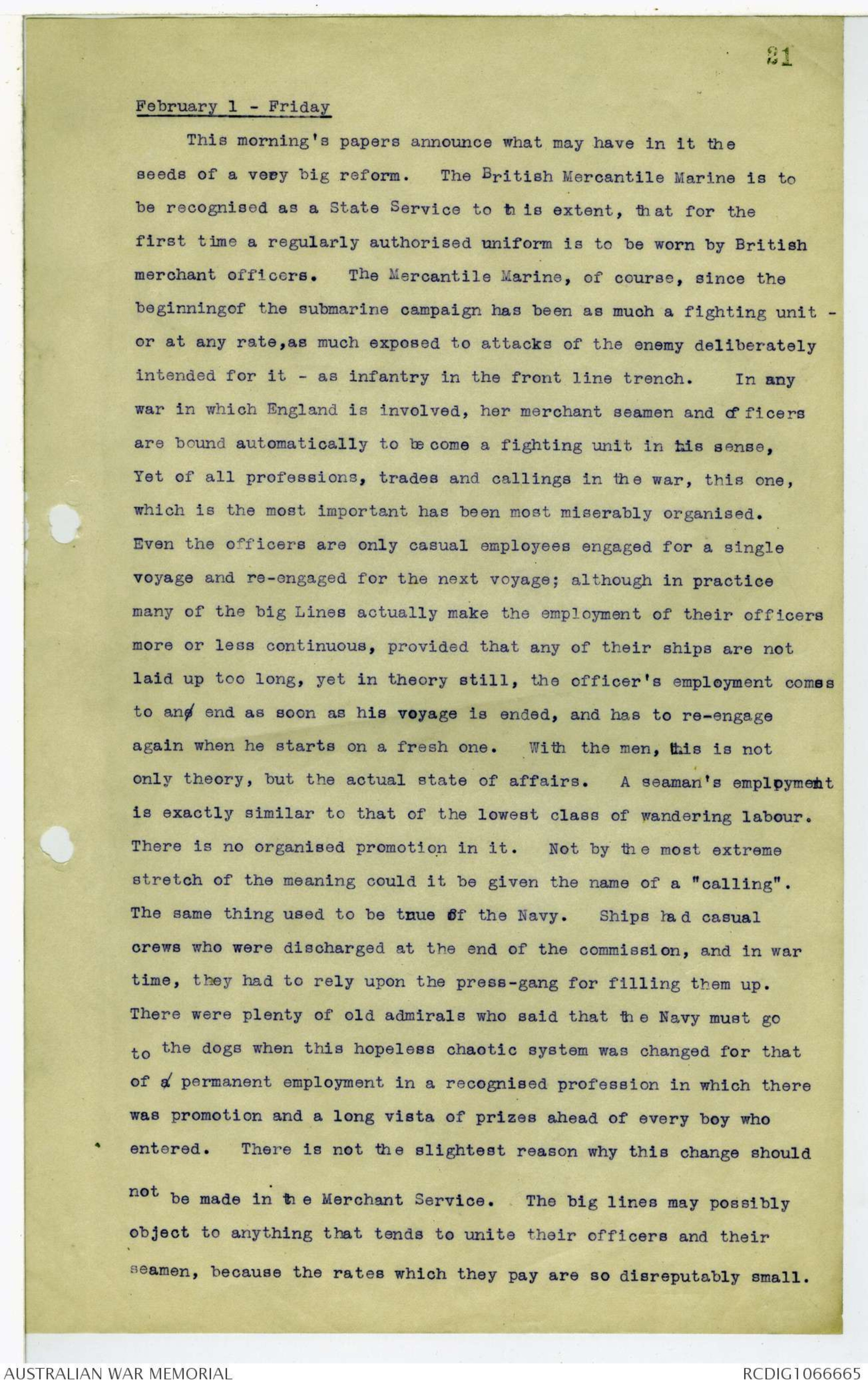
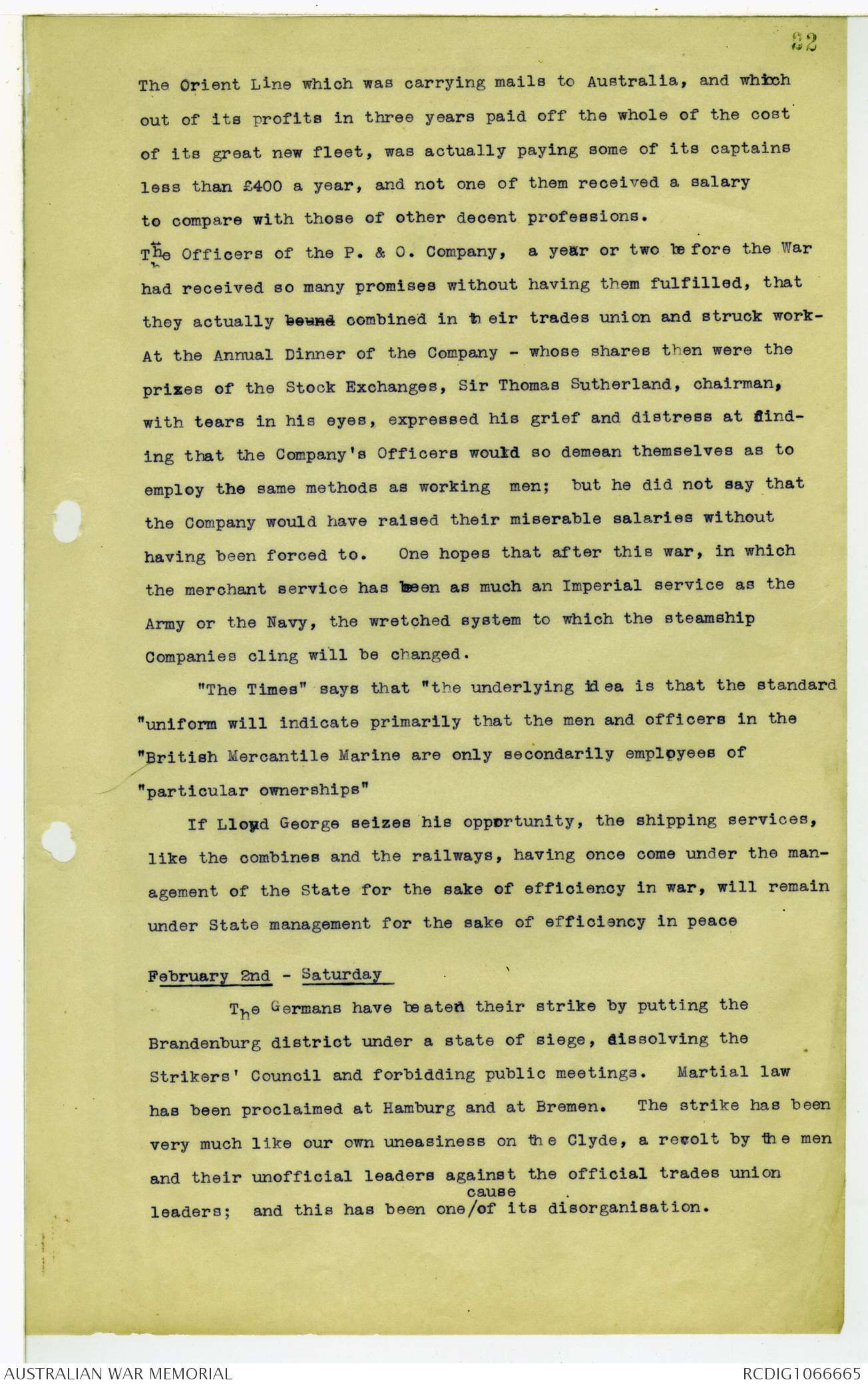
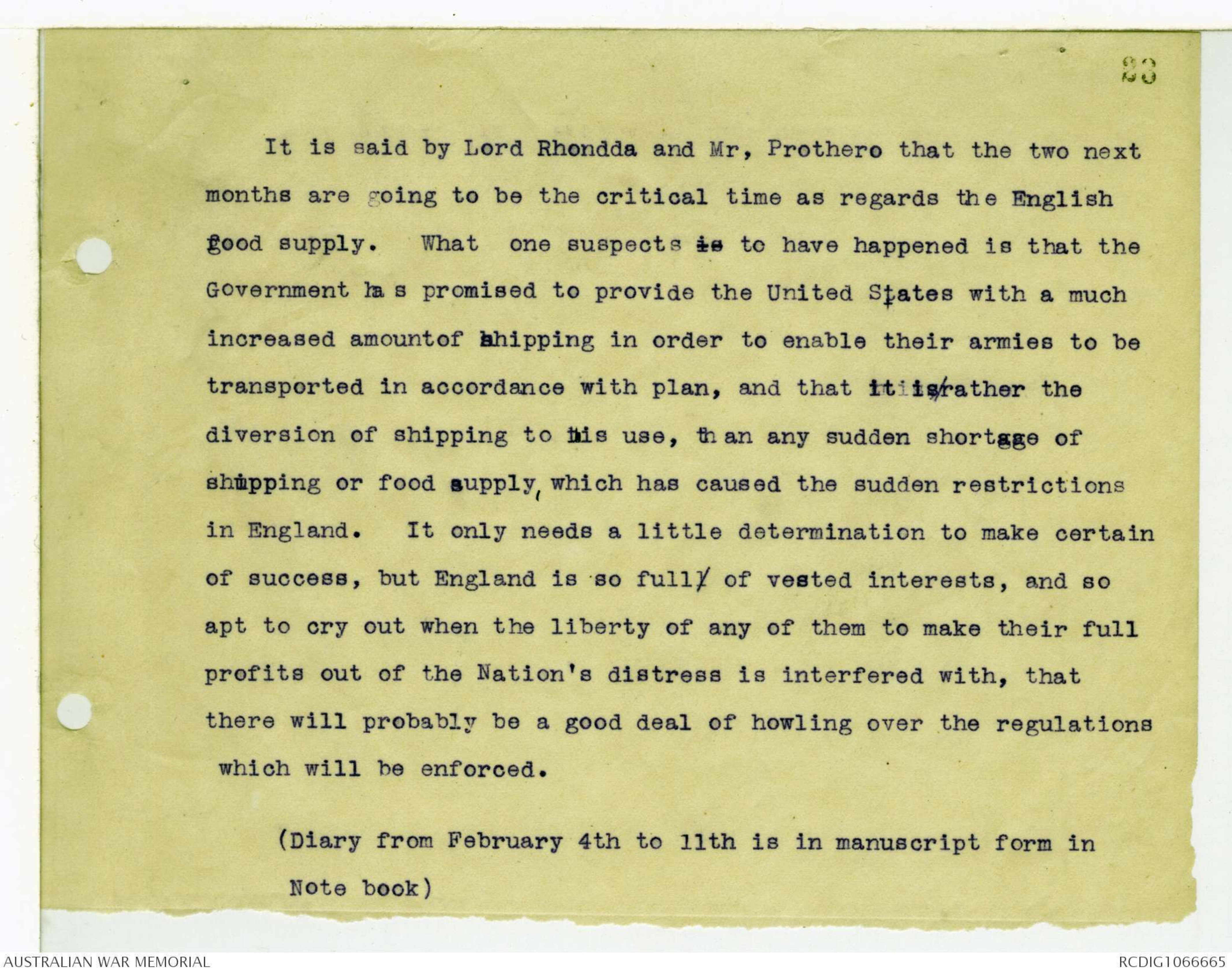
19
line we have ever held - I am told that in some parts of the
Front the conditions almost amount to what two years ago would
have been called fraternisation. Fraternisation at the present
moment would do a great deal more harm to the Germans than to
ourselves.
With best of luck,
Yours
CEWB.
6.
Original Diary 20
COPY
Desert Mounted Corps
January 4/17 8
18
Dear Charlie,
Hurley is here and is travelling at his customary pace.
His prospects, however, is are not as good as one could wish. Since
the big drive finished - roughly from Jaffre East - the L.H. has
been doingnone of its destructive work. At present neither the
Military situation nor the state of the country promises activity
for a mounted force. Hurley has had a few days with the 3rd Bde
acting practically as infantry - holding occasional posts in the
mountains, but I gather that he saw little of special interest.
He is now going to other brigades at rest in a picturesque setting
on the edge of the sandhills, and there and elsewhere he will
doubtless secure a remarkably attractive and relatively
interesting set of pictures. His colour work should in itself
be a good feature. The weather however is far from good.
He has had a majority of wet and dull days. He has therefore
decided to extend his visit for another five weeks at least
and wishes you to know but probably he will think it well to
cable.
My own work progresses slowly. It is a long and not altogether
satisfactory task to pick up two years' campaign which
has been both active and full of change. However,a great field
is here and I shall do all I can to get a live story. Still
without horses: no end of a handicap, but they are now
"available" but God knows where
The records work I am in a sense neglecting for the another
five weeks (in whixh I hope to cover in a rough way the campaign
to date) but of course I talk diaries etc. as I go. The diary
record is a very slender one. The Light Horseman is not a
genius with a peni
Regards to Smartie and Treloar,
Yours sincerely,
(Sgd) H. S. Gullett
21
February 1 - Friday
This morning's papers announce what may have in it the
seeds of a very big reform. The British Mercantile Marine is to
be recognised as a State Service to this extent, that for the
first time a regularly authorised uniform is to be worn by British
merchant officers. The Mercantile Marine, of course, since the
beginningof the submarine campaign has been as much a fighting unit-
or at any rate,as much exposed to attacks of the enemy deliberately
intended for it - as infantry in the front line trench. In any
war in which England is involved, her merchant seamen and officers
are bound automatically to become a fighting unit in his sense,
Yet of all professions, trades and callings in the war, this one,
which is the most important has been most miserably organised.
Even the officers are only casual employees engaged for a single
voyage and re-engaged for the next voyage; although in practice
many of the big Lines actually make the employment of their officers
more or less continuous, provided that any of their ships are not
laid up too long, yet in theory still, the officer's employment comes
to ane end as soon as his voyage is ended, and has to re-engage
again when he starts on a fresh one. With the men, this is is not
only theory, but the actual state of affairs. A seaman's employment
is exactly similar to that of the lowest class of wandering labour.
There is no organised promotion in it. Not by the most extreme
stretch of the meaning could it be given the name of a "calling".
The same thing used to be true of the Navy. Ships had casual
crews who were discharged at the end of the commission, and in war
time, they had to rely upon the press-gang for filling them up.
There were plenty of old admirals who said that the Navy must go
to the dogs when this hopeless chaotic system was changed for that
of a permanent employment in a recognised profession in which there
was promotion and a long vista of prizes ahead of every boy who
entered. There is not the slightest reason why this change should
not be made in the Merchant Service. The big lines may possibly
object to anything that tends to unite their officers and their
seamen, because the rates which they pay are so disreputably small.
22
The Orient Line which was carrying mails to Australia, and which
out of its profits in three years paid off the whole of the cost
of its great new fleet, was actually paying some of its captains
less than £400 a year, and not one of them received a salary
to compare with those of other decent professions.
The Officers of the P. & O. Company, a year or two before the War
had received so many promises without having them fulfilled, that
they actually bound combined in their trades union and struck work-
At the Annual Dinner of the Company - whose shares then were the
prizes of the Stock Exchanges, Sir Thomas Sutherland, chairman,
with tears in his eyes, expressed his grief and distress at finding
that the Company's Officers would so demean themselves as to
employ the same methods as working men; but he did not say that
the Company would have raised their miserable salaries without
having been forced to. One hopes that after this war, in which
the merchant service has been as much an Imperial service as the
Army or the Navy, the wretched system to which the steamship
Companies cling will be changed.
"The Times" says that "the underlying idea is that the standard
"uniform will indicate primarily that the men and officers in the
"British Mercantile Marine are only secondarily employees of
"particular ownerships"
If Lloyd George seizes his opportunity, the shipping services,
like the combines and the railways, having once come under the management
of the State for the sake of efficiency in war, will remain
under State management for the sake of efficiency in peace
February 2nd - Saturday
The Germans have beaten their strike by putting the
Brandenburg district under a state of siege, dissolving the
Strikers' Council and forbidding public meetings. Martial law
has been proclaimed at Hamburg and at Bremen. The strike has been
very much like our own uneasiness on the Clyde, a revolt by the men
and their unofficial leaders against the official trades union
leaders; and this has been one/ cause of its disorganisation.
23
It is said by Lord Rhondda and Mr, Prothero that the two next
months are going to be the critical time as regards the English
good supply. What one suspects is to have happened is that the
Government has promised to provide the United States with a much
increased amountof shipping in order to enable their armies to be
transported in accordance with plan, and that it is/rather the
diversion of shipping to this use, than any sudden shortage of
shipping or food supply, which has caused the sudden restrictions
in England. It only needs a little determination to make certain
of success, but England is so fulll of vested interests, and so
apt to cry out when the liberty of any of them to make their full
profits out of the Nation's distress is interfered with, that
there will probably be a good deal of howling over the regulations
which will be enforced.
(Diary from February 4th to 11th is in manuscript form in
Note book)
 Sue Ballyn
Sue BallynThis transcription item is now locked to you for editing. To release the lock either Save your changes or Cancel.
This lock will be automatically released after 60 minutes of inactivity.